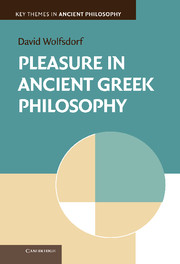Book contents
- Frontmatter
- Contents
- Acknowledgments
- Chapter 1 Introduction
- Chapter 2 Pleasure in early Greek ethics
- Chapter 3 Pleasure in the early physical tradition
- Chapter 4 Plato on pleasure and restoration
- Chapter 5 Plato on true, untrue, and false pleasures
- Chapter 6 Aristotle on pleasure and activation
- Chapter 7 Epicurus and the Cyrenaics on katastematic and kinetic pleasures
- Chapter 8 The Old Stoics on pleasure as passion
- Chapter 9 Contemporary conceptions of pleasure
- Chapter 10 Ancient and contemporary conceptions of pleasure
- Suggestions for further reading
- General Index
- Index of Greek and Latin Words and Expressions
- Index of Quotations from Ancient Authors
- Index of Quotations from Contemporary Authors
- References
Chapter 6 - Aristotle on pleasure and activation
Published online by Cambridge University Press: 05 December 2012
- Frontmatter
- Contents
- Acknowledgments
- Chapter 1 Introduction
- Chapter 2 Pleasure in early Greek ethics
- Chapter 3 Pleasure in the early physical tradition
- Chapter 4 Plato on pleasure and restoration
- Chapter 5 Plato on true, untrue, and false pleasures
- Chapter 6 Aristotle on pleasure and activation
- Chapter 7 Epicurus and the Cyrenaics on katastematic and kinetic pleasures
- Chapter 8 The Old Stoics on pleasure as passion
- Chapter 9 Contemporary conceptions of pleasure
- Chapter 10 Ancient and contemporary conceptions of pleasure
- Suggestions for further reading
- General Index
- Index of Greek and Latin Words and Expressions
- Index of Quotations from Ancient Authors
- Index of Quotations from Contemporary Authors
- References
Summary
As in Plato’s corpus so in Aristotle’s, the topic of pleasure arises in numerous passages. By far the most important of these occur in Aristotle’s ethical writings, specifically in Eudemian Ethics and Nicomachean Ethics, more precisely still in Eudemian Ethics, Book 6, sections 4–5 and sections 11–14; and in Nicomachean Ethics, Book 3, section 10; Book 7, section 4–5 and sections 11–14; and Book 10, sections 1–5.
An ethical treatise transmitted in the Aristotelian corpus and entitled Magna Moralia also contains an important discussion of pleasure (precisely, at Magna Moralia 2.7). There has been a long-standing debate over the authenticity of this work.
One further substantial treatment of pleasure occurs in Aristotle’s rhetorical treatise Rhetoric 1.11. Here again the treatment is closely related to ethics. At least, one of the central concerns of Aristotelian ethics is the cultivation of emotional dispositions, and one of the central concerns of rhetoric is manipulation of emotions.
There are also numerous, more cursory treatments or mentions of pleasure scattered throughout Aristotle’s corpus, for example, in the following logical, metaphysical, physical, biological, and psychological works: Posterior Analytics, Topics, Categories, Physics, On the Generation of Animals, On the Soul, and On Sense-Perception and Sensibles. Finally, pleasure plays an important role in a number of the surviving fragments of Aristotle’s Protrepticus, a work whose title translates as “Exhortation” and which, in contrast to all of the other works mentioned, was intended for a relatively broad and public audience as opposed to committed students of philosophy and specifically those of Aristotle’s school, alternately known as the Lyceum or Peripatos.
- Type
- Chapter
- Information
- Pleasure in Ancient Greek Philosophy , pp. 103 - 143Publisher: Cambridge University PressPrint publication year: 2012



